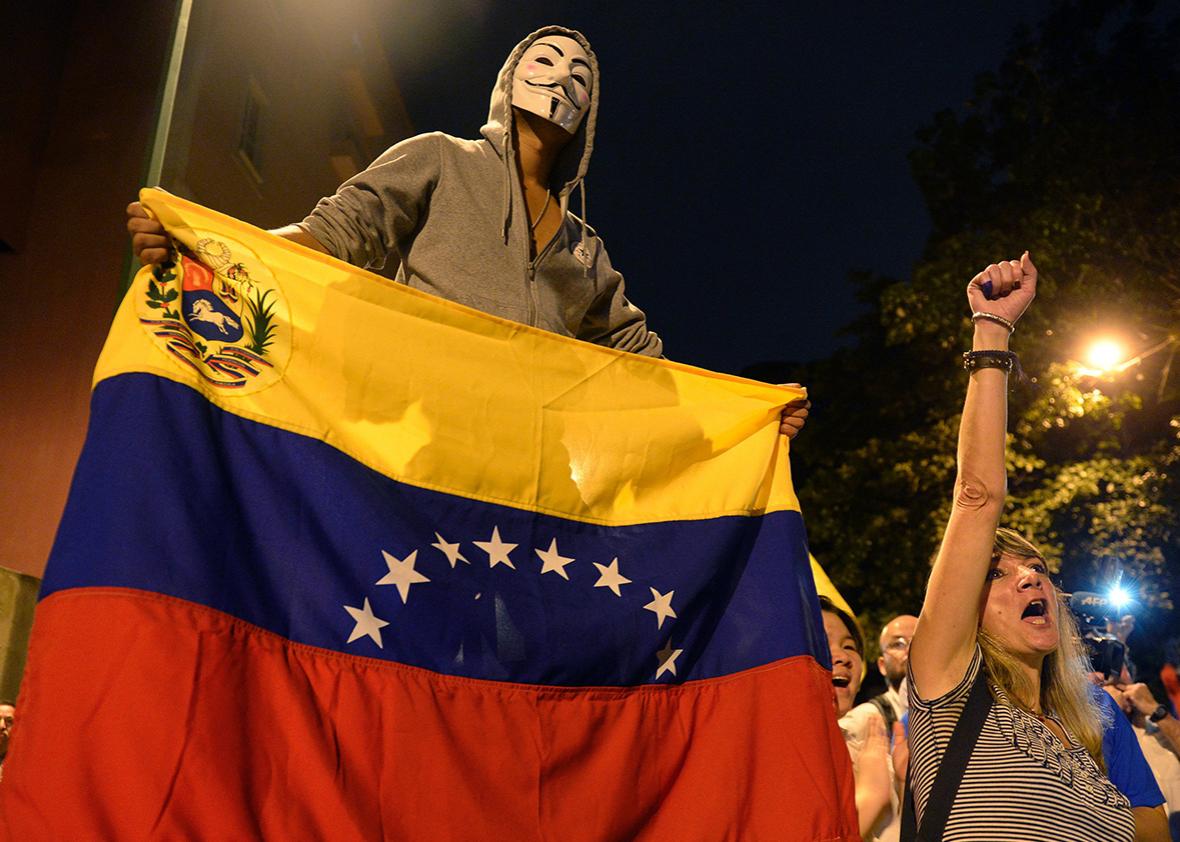Dictators are typically bad losers. Whenever the late Venezuelan president Hugo Chavez felt in danger on the eve of an election, he would conjure the possibility of violence, death, or chaos if the vote didn’t go his way. The modern dictator doesn’t threaten a bloodbath, of course; rather, he suggests obliquely that “forces could be unleashed,” that the “will of the people” cannot be denied, or that the “streets will erupt.” Slobodan Milosevic always warned that Serbia would fall “into the hands of NATO aggressors.” And Venezuelan President Nicolas Maduro followed suit in the final days of Venezuela’s parliamentary election, accusing the United States of plotting his demise and saying that the opposition “better pray” that his ruling party win or he might simply seize control of the parliament if the opposition won.
On Sunday night, against the backdrop of fireworks and honking horns, Maduro’s nightmare came to pass. With 22 races still too close to call, the opposition captured 99 seats in the 167-member National Assembly, more than double the number won by the ruling party. Some election watchers believe the opposition’s tally could rise to 112 or 113 seats. If the opposition wins a supermajority, it would have the power to pass major pieces of legislation, sack ministers and Supreme Court justices, and rewrite Chavez’s 1999 constitution that centralized so much power in the president’s hands. With voter turnout topping 74 percent, the opposition can credibly claim a mandate to undo the country’s failed socialist project, which has left Venezuela an economic basket case. That will likely not just mean calling for a presidential referendum to remove Maduro from office next year, but also the release of unjustly imprisoned political prisoners such as opposition leader Leopoldo Lopez.
Not that Maduro and his political cronies didn’t reach deep into their bag of dirty tricks. The regime had extra representatives assigned to areas where it was expected to perform well. Some opposition candidates were banned from running, a well-worn Chavista tactic. The government intentionally crafted a confusing ballot, creating a separate party whose name was sufficiently similar to the opposition’s formal name to draw votes away. The government even introduced a candidate with the same name as one of the opposition candidates, in an incredible attempt to confuse people into voting for the imposter.
The trouble is that electoral tricks couldn’t distract from the country’s collapse. Venezuela is the rare petrostate that suffers from chronic shortages of basic staples and medicine. Its public services have lapsed into utter dysfunction. The only things rising in Venezuela are the rates of crime, murder, and inflation—typically the world’s highest these days. The legacy of Chavez’s authoritarianism is all that had kept Maduro in the presidential palace. But the failure of Chavismo’s policies—the country’s slide into the community of failed states—has become too great for even its sympathizers to deny.
But authoritarianism doesn’t just concede victory; it must be won—and Venezuela’s opposition came prepared on Sunday. The get-out-the-vote effort for young voters was impressive, on par with a similar campaign run in Serbia in 2000. Planeloads of Venezuelans who had been forced to flee the country in recent years returned home to cast a vote. The opposition was ready to defend their votes as well. They had more than 5,000 volunteers, trained in nonviolent tactics, divided into more than 1,000 small cells and stationed at the most important polling stations across the country, according to a senior member of the team spearheading this effort. They had also developed a quick count system and centralized their collection of election data from volunteers so that they could spot irregularities or violations in “almost real time.”
This fight, however, is nowhere near over. Maduro and the ruling party will attempt to marginalize this victory in the weeks and months ahead through a variety of means. And it has the capability: Despite this landslide victory, the ruling party still has control of the machinery of state and the media. Maduro will most likely accept this loss now—thereby burnishing his democratic credentials and silencing international critics—only to try to undermine its practical significance later. Expect the courts to issue rulings circumscribing the powers of the legislature. Expect new edicts and orders concentrating even more power into the executive. Look for government budgets and competencies to shift. Watch out for allegations of corruption and criminal offenses against key members of the opposition.
Even if the opposition succeeds in combating these efforts and prevents “Chavista business as usual,” experience tells us that the real challenge lies ahead. Lessons from Ukraine or the Arab Spring have proven that it is one thing to win at the ballot box and another to manage and secure a meaningful transition. Opposition movements don’t only require plans for Day 1—reversals of some of the regime’s most repressive political practices—but a vision on how to stop the country’s free-fall. Even without the ruling party attempting to play a spoiler, the challenges will be immense. The opposition must maintain its unity among a diverse coalition of personalities and forces, and avoid falling into the “Ukrainian trap” of infighting among democratic leaders. It must offer solutions to fix the country’s broken economy and effectively fight gang violence, while enlisting the support of almost a million mostly young and educated Venezuelans who have left the country in the last decade.
Today the opposition can celebrate. They are engaged in a long struggle, and victories need to be cherished; they are what give a movement the stamina to keep going. And they will need that stamina. Political figures like Nicolas Maduro rarely retreat peacefully, especially when cornered by the threat of prosecution for their crimes. Tomorrow the fight will begin anew.
